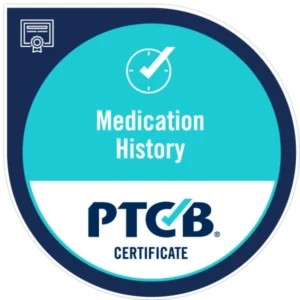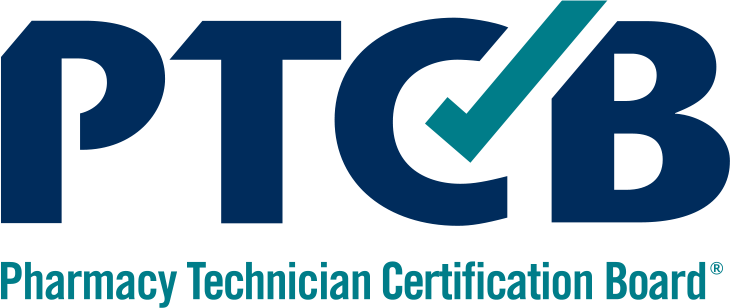Indicate your advanced knowledge to collect in-depth and accurate medication histories, review prescriptions to confirm dosing accuracy, and complete detailed administrative functions.
INTRO
Technicians who earn the Medication History Certificate have specialized knowledge and can be confident in assuming advanced roles that will allow pharmacists more time to engage in direct patient care. Demonstrate that you have the knowledge and the tools to perform in-depth medication histories, identify potential medication errors and complete administrative duties related to medication reconciliation.
Complete the Medication History Certificate to demonstrate your competency in:
- Gathering medication histories with accuracy
- Identifying potential errors or necessary clarifications with acute precision
- Alleviating pharmacists’ time completing various administrative tasks

PREPARE & APPLY
Back to TopA Step Toward Your Advanced CPhT (CPhT-Adv)
Earning this certificate takes you one step closer to becoming a PTCB Advanced Certified Pharmacy Technician® (CPhT-Adv®). Active PTCB CPhTs who have completed at least four of the certificate programs, or three certificate programs and the Compounded Sterile Preparation Technician® (CSPT®) Certification, and 3 years of work experience will be eligible to earn a CPhT-Adv credential.
Eligibility Requirements
A candidate must hold an active PTCB CPhT Certification and fulfill one of the following eligibility pathways:
Pathway 1: Completion of a PTCB-Recognized Medication History Education/Training Program and at least 6 months of experience conducting medication histories and/or similar experiences of patient-focused communication (such as intake of new patients/prescriptions and answering patient questions).*
Pathway 2: At least 12 months of full-time experience conducting medication histories and/or similar experiences of patient-focused communication (such as intake of new patients/prescriptions and answering patient questions).*
*Approximately 50% of time spent in work activities should involve patient-focused communication (e.g., intake of new patients/prescriptions, answering patient questions). The intention of the requirement is that pharmacy technicians with full-time work experience in community pharmacies and/or work experience in ambulatory/hospital roles focused on taking medication histories will meet the spirit of the requirement.
Candidates are required to complete and upload the Supervisor Attestation Form for the PTCB Medication History Certificate Program at the time of application submission.
Educational Requirement
One of the eligibility pathways for this certificate program includes completing a PTCB- Recognized Medication History Education/Training Program. PTCB-Recognized Programs have been reviewed and found to provide learners with foundational knowledge that will help them be successful on PTCB exams. Please note that PTCB-Recognized Programs may not cover all information that appears on your exam. It is important that you review the exam content outline as part of your preparation and seek supplemental resources as needed.
View a list of PTCB-Recognized Education/Training Programs for the Medication History Certificate.
Exam Fee
The fee to apply for this certificate exam is $89.
How to Apply and Schedule
- Apply by logging into your PTCB Account.
- Once your application is approved, you will receive an email with your authorization to schedule your exam.
The Medication History Certificate Exam is administered through online proctored testing and in-person at more than 1,400 Pearson Test Centers nationwide, including more than 100 military on-base sites.
Prepare for Your Exam
Online Testing Requirements Overview
This quick video explains the requirements and policies for online proctored testing.
Pearson Tutorial
The Pearson tutorial provides a preview of the testing experience and functionality for PTCB exams.
Exam Content Outline
The Medication History Exam covers several knowledge areas organized into two domains. Be sure to review the content outline as part of your exam preparation.
| Concepts/Terminology of Medication History (45%) |
| Definitions of key terms in the medication history process (e.g., medication allergy vs. medication intolerance, medication adherence) |
| Translation between patient-friendly terms and medical terminology |
| Adherence metrics and differences between primary and secondary nonadherence |
| Common vaccinations and vaccination schedules |
| Patient Safety and Quality Assurance Strategies (55%) |
| Types of prescription/medication errors (e.g., abnormal doses, incorrect quantity, incorrect strength, incorrect drug, incorrect route of administration, incorrect directions, wrong timing, missing dose, misinterpretation of drug concentration) |
| Potential impact of medication errors, including look-alike/sound-alike medications (e.g., ampicillin/amoxicillin) |
| Patient factors that influence the ability to report medication information accurately and adhere to prescribed dosing schedules |
| HIPAA and best practices to maintain patient confidentiality during patient conversations |
| Techniques or devices to assist with safe and consistent home medication use (e.g., pill boxes, medication calendars, medication alarms) |
| Procedures to verify patient identity, including appropriate identifiers and knowledge of limitations for different identifiers |
EARN YOUR CERTIFICATE
Back to TopAbout the Exam
The Medication History Certificate Exam is a computer-based exam with 70 multiple-choice questions. Be prepared to commit 1 hour and 30 minutes for the exam (5-minute tutorial, 1 hour and 20-minute exam, and 5-minute post-exam survey).
Exam Day Requirements
When you schedule your exam, you may choose to take your PTCB exam at a Pearson test center or online from your own computer under the virtual supervision of a live proctor.
- Arrive at the designated Pearson test center 30 minutes prior to your appointment. If you are testing online, check-in 30 minutes prior to your appointment.
- Bring an approved form of identification that matches your name as it appears on your PTCB Account. You will not be allowed to take the exam without proper identification.
- Prior to your exam day, be sure to review more details about what to expect and important information about online testing requirements in our Help Center.
Testing Accommodations
Candidates who require testing accommodations must request these accommodations during the application process. Accommodations that are reasonable and consistent with the Americans with Disabilities Act (ADA) will be provided by PTCB at no additional cost to candidates. Learn more.
NEXT STEPS
Back to TopScoring
The passing scaled score is 300. The range of possible scores based on the exam content outline is 0 to 400. Your official score report will be presented on screen following your exam. If you pass the exam, your credential status can be verified through PTCB Certification Verification.
Certificates
Once your official score is available, you can download your certificate through the Credly Platform. Learn more.
Digital Badges
Upon earning your credential, you will receive an email invitation from the Credly Platform via badge@ptcb.org with instructions for claiming your badge and setting up your account.
This digital badge will contain information describing your credential, including how you earned it. You can display the badge in your email signature, electronic files of a resume, and on social media sites like LinkedIn, Facebook, and Twitter.
Renew
This certificate program does not require renewal.
DOCUMENTS
Back to TopQuick access to additional documents you may need during this process. Download the necessary documents and submit the completed forms as required.
